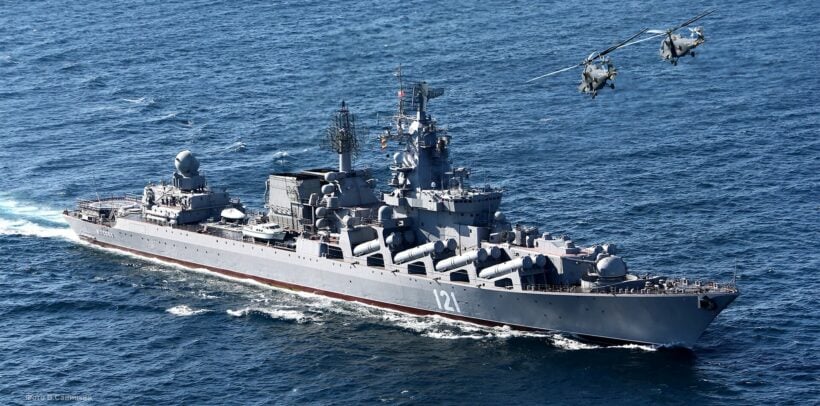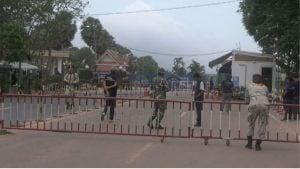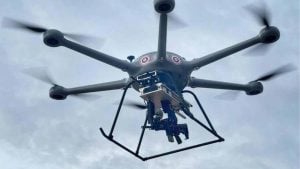UPDATE: Russia’s flagship vessel sinks in Black Sea after Ukrainian missile strike

As Russia’s war in Ukraine entered its 50th day, its flagship cruiser has sunk in the Black Sea, after a “fire” onboard caused ammunition explosions. It’s the first major war ship to be taken down by cruise missiles since World War Two. At least, that’s the Ukrainian side of the story.
Russia’s Ministry of Defence has released a statement on state media confirming the vessel sank while being pulled to port for repairs in Crimea…
“During the towing of the Moskva cruiser to the port of destination, due to damage to the hull received during the fire from the detonation of ammunition, the ship lost stability. In the conditions of stormy seas, the ship sank.”
Russian state media had earlier reported on Wednesday that a fire onboard the ship had detonated ammunition, requiring sailors to abandon ship. They made no mention of a Ukrainian strike, neither did they report any casualties. Russia’s Ministry of Defence has just released a statement about the incident, claiming…
“The fire on the cruiser Moskva is under control. There are no flames visible. Ammunition supplies are no longer exploding. The cruiser Moskva is still afloat. The main missile armoury has not been damaged. The crew of the cruiser were evacuated to Black Sea Fleet vessels nearby. Measures are being taken to tow the cruiser into port. The causes of the fire are currently being established.”
The ‘Moskva’ carried close-in missile defense systems, naval weapons and torpedos, as well as various anti-aircraft and anti-ship missiles — all of which could cause huge explosions onboard if fire were to reach its ammunition stores. According to the former director of operations at the US Pacific Command’s Joint Intelligence Center, Carl Schuster…
“When a fire reaches your ammunition magazine[s], you have two choices: One, flood them, or two, abandon ship. Otherwise your crew is onboard to be wiped out by the catastrophic explosion that follows a fire reaching several hundred tons of ordnance.”
A guided missile cruiser, ‘Moskva’ is the flagship of the Russian navy’s Black Sea fleet. Storms over the area have so far obscured satellite imagery, preventing visual confirmation of the condition and location of the vessel. However, experts say such a fire, whether the cause of a missile strike or not, would be enough to prompt an explosion, sinking the ship to the bottom of the sea.
At 186 metres long, and with a crew of nearly 500, the ‘Moskva’ is the largest Russian naval ship in the Black Sea. According to the military site Naval-Technology.com, the vessel was originally commissioned into the Soviet navy in the 1980s as the “Slava” before being in 1995. It was then refitted with newer technology, re-entering service in 1998.
In a post on Telegram, Odessa state regional administrator Maxim Marchenko claimed that Ukrainian forces have used Neptune cruises missiles to attack the ‘Moskva’. If true, the Moskva may be the largest warship ever taken out by a missile, according to Schuster, who is a retired US Navy captain. The strike would also be a huge milestone for Ukrainian military.
The Neptune is a Ukrainian-made weapon based on the Soviet KH-35 cruise missile. According to Ukrainian media reports, the Ukrainian navy began using the weapon in 2021. Ukraine claims they destroyed a Russian military ship in an occupied port at 2:02am on Tuesday morning.
This could be the first confirmed use of a Neptune missile during the war, according to a post on the website of the Center for International Maritime Security, or CIMSEC, on Tuesday, which addressed the claimed attack.
In the CIMSEC post, US Navy surface warfare officer Lt. Cmdr. Jason Lancaster who wrote that the theater of mobile, shore-based cruise missiles changes how an enemy behaves. He noted that Russian ships “will operate in ways to minimise the risk of detection and maximize their chances to defend themselves”.
In other wars, the Neptune missile effectively limits Russia’s ability to use their war ships to gain a strategic advantage.
“The added stress of sudden combat increases fatigue and can lead to mistakes.”
SOURCE: CNN
Latest Thailand News
Follow The Thaiger on Google News:


















![New cafes to check out in Bangkok [2025 edition] | Thaiger](https://thethaiger.com/wp-content/uploads/2025/07/Copy-of-Featured-Image-Template-4-300x169.jpg)







